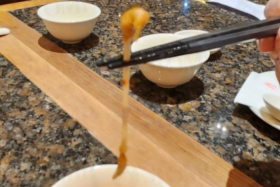Why bubble tea is not so sweet for your health
Find out how the sugar-sweetened beverage affects your health, especially when available in shops again
Bubble tea has been a popular drink among Singaporeans over the years, as evidenced by the recent long queues for it when standalone shops were temporarily shut.
However, many do not realise that it is considered a sugar-sweetened beverage and should be consumed in moderation, preferably limiting intake to once a week or less.
Sugar-sweetened beverages contain free sugars, which are added sugars (like glucose, fructose or table sugars) or sugars naturally present in honey, syrups, fruit juices and fruit juice concentrates.
A high intake of free sugars may lead to weight gain, an increased risk of overweight or obesity, chronic diseases and dental caries (tooth decay).
A 2018 Singapore review revealed that every additional cup (250ml) of sugar-sweetened beverage daily increases one's risk of diabetes by a significant 26 per cent.
In Singapore, the Health Promotion Board recommends limiting intake of added sugars to eight to 11 teaspoons a day, and even less for young children.
A single medium-sized (450ml) pearl milk tea with full sugar contains about eight teaspoons of sugar and 366 calories.
This easily meets 100 per cent of our daily sugar recommendations, and 16 per cent to 20 per cent of our daily calorie requirements.
What are the ingredients in bubble tea and are they good for you?
A cup typically consists of:
- Tea (black tea, green tea, oolong tea): Contains phytochemicals, which have anti-inflammatory and anti-oxidant properties. Regular tea consumption has been shown to improve the function of blood vessels, reduce visceral fat and improve heart health. However, adding sugar and milk can significantly increase its calories.
- Non-dairy creamer: A milk substitute made from hydrogenated vegetable oil and glucose syrup. It contains saturated and trans fat, which are associated with an increased risk of high cholesterol levels, heart disease and stroke.
- Tapioca pearls: A starch extracted from a root vegetable, tapioca contains carbohydrates, which will affect blood sugar levels. In addition, pearls and most toppings are soaked in syrup before serving. A serving of pearls contains 156 calories, contributing to almost half of the calories in the bubble tea.
- Flavouring (honey, winter melon, passion fruit, brown sugar): Flavoured syrups or fruit concentrates usually contain free sugars. Additional flavouring (honey, caramel or hazelnut) and toppings (brown sugar pearl, cheese foam or milk foam) can easily increase the sugar, and thus calories.
So how should you customise a healthier cup of bubble tea?
- Choose your drink: Plain tea base (green tea, black tea, oolong tea, alisan tea) and fresh milk base (skimmed or low-fat milk if available). Avoid milk tea or fruit-based tea, minimise calories from non-dairy creamer and fruits and opt for drinks with the Healthier Choice symbol if available.
- Modify your size: Smaller cup, fewer calories.
- Select your toppings: Opt for lower calorie toppings (aloe vera, white pearl, aiyu jelly, azuki bean). Or skip them entirely, especially black pearl and milk and cheese foam.
- Reduce sugar level: Choose no or less sugar. If there is milk, fruit tea or toppings added, choosing 0 per cent sugar level does not make your drink zero in calories or sugars.
- Select ice level: With reduced sugar levels, you can opt for less ice to make your drink less diluted.
The writer is a dietitian at SingHealth Polyclinics
Don't have time to make healthier bubble tea at home? Order one now with GrabFood!
Get The New Paper on your phone with the free TNP app. Download from the Apple App Store or Google Play Store now



